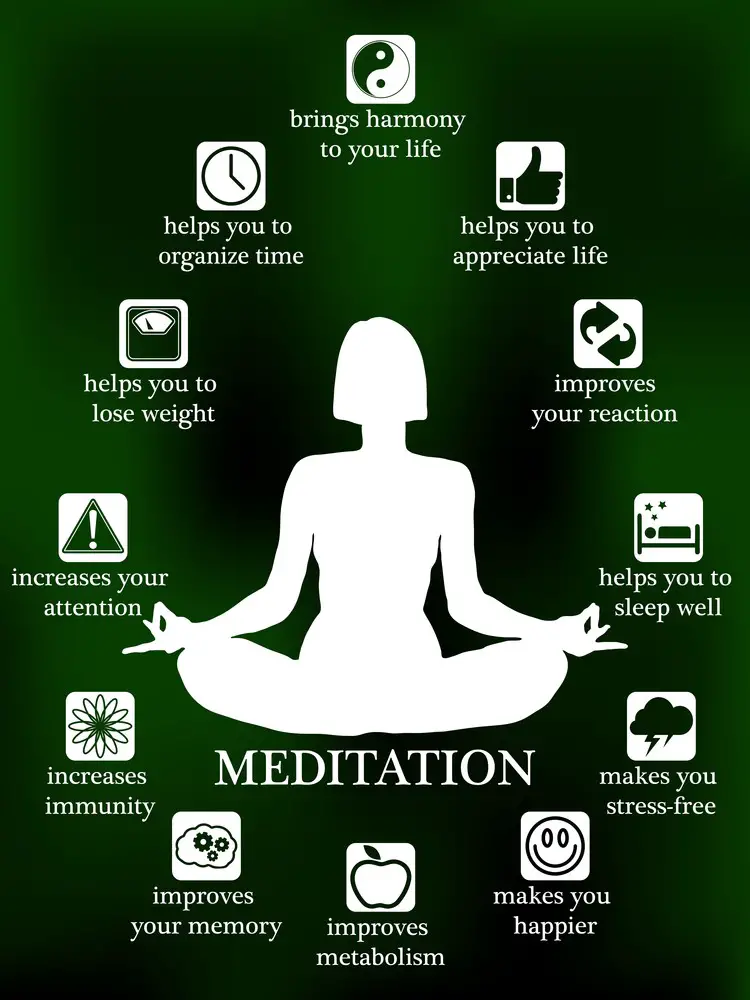As a BetterHelp affiliate, we receive compensation from BetterHelp if you purchase products or services through the links provided
Meditation, an ancient practice that has gained immense popularity recently, is often hailed as a powerful tool to promote mindfulness, emotional well-being, and stress reduction. Despite its numerous benefits, many individuals find meditation challenging and hard to maintain as part of a routine. The reasons behind this struggle are varied and unique to each person, making it essential to examine them to understand better and appreciate the complexities of stepping into the meditative world.
Meditation requires a stillness of mind and body that often feels counterintuitive, especially in a fast-paced and continuously connected society. It can be difficult for beginners to quiet their thoughts and relinquish control of their conscious minds. Others may experience emotional or mental obstacles, such as anxiety, fear, or frustration, which impede their ability to establish a consistent meditation practice. Developing patience and self-compassion is crucial in overcoming these challenges, yet it often takes time and commitment that may initially seem daunting.
Key Takeaways
- Meditation can be challenging due to mental and emotional obstacles
- Cultivating patience and self-compassion is key to overcoming struggles
- Consistent practice and commitment to meditation yield numerous benefits

Understanding Meditation
Meditating might seem daunting, but it’s easier to comprehend when we break it down. Let’s explore the different forms of meditation to understand why it can be challenging for some folks.
Different Forms of Meditation
First and foremost, it’s crucial to recognize that there are various types of meditation—each with its unique set of techniques and approaches. Some common forms include mindfulness, yoga, and transcendental meditation. Because our minds and bodies respond differently to each method, it’s natural to feel more at ease with one style over another.
Mindfulness meditation encourages practitioners to focus their attention on the present moment. By zeroing in on the breath, bodily sensations, or other focal points, we train our minds to stay present rather than wander into a never-ending stream of thoughts. Despite its simplicity, mindfulness requires discipline and patience—two qualities that can make this practice difficult for beginners.
Conversely, yoga is a form of moving meditation that harmonizes the body, breath, and mind. While many people are drawn to yoga for its physical benefits, it also encourages mental stillness. For some, the coordination of movement and breath may feel more natural than sitting in silence. Yet, certain yoga poses’ physical challenges and flexibility requirements can be a barrier for others.
Lastly, transcendental meditation involves the repetition of a mantra—a word or sound intended to help the practitioner transcend their ordinary state of consciousness. This form of meditation requires consistent practice, and its effectiveness can vary depending on the individual’s affinity for the mantra and the depth of concentration they can achieve.
In conclusion, the difficulty of meditation largely depends on the individual’s predispositions and the specific technique being used. Experimenting with different forms of meditation can help you find the method that resonates best with your personal needs and preferences.

Challenges in Meditation
Despite its numerous benefits, meditation can be a difficult practice to master. Meditators face distinct challenges along their journey, making persistence and patience key to success. This section will explore two fundamental challenges: Focus and Attention and Dealing with Distractions.
Focus and Attention
One of the primary challenges in meditation is maintaining focus and attention throughout the practice. It can be tricky to quiet the mind and bring it to the present moment.
We are continually bombarded with thoughts, worries, and to-do lists daily. This constant barrage of mental chatter can make it difficult to focus our attention and truly embrace the meditative experience. It is natural for the mind to wander, but the key here is learning to gently redirect it back to the object of meditation, such as the breath or a mantra.
The challenge of maintaining focus requires determination and consistent practice. As with any skill, the more one engages with meditation, the stronger the focus and attention become.
Dealing with Distractions
Another challenge meditators frequently encounter is dealing with distractions. These can come in various forms, such as mental disturbances (e.g., intrusive thoughts, emotions, or memories), physical discomfort (e.g., itchiness, pain, or fatigue), or external noise.
For instance, trying to meditate in a noisy environment can pose a significant obstacle for beginners. However, it is essential to recognize that distractions are a natural part of the meditative journey. The solution is not to eliminate distractions entirely but to learn to acknowledge them without becoming overpowered or consumed by their presence.
One helpful technique is to treat distractions as objects of meditation themselves. Instead of fighting against them, meditators can observe and accept their existence, letting them flow through the mind without attaching to them too strongly. This approach enables a deeper understanding of the mind’s workings and gradually strengthens the ability to concentrate in the face of numerous distractions.
In conclusion, meditation might be challenging, but overcoming these obstacles is an incredibly rewarding experience. As one master focus, attention, and dealing with distractions, the true benefits of meditation reveal themselves, leading to personal growth, inner peace, and increased mental resilience.
Mental and Emotional Obstacles
Managing Anxiety and Stress
It’s undeniable that the mind plays a pivotal role in meditation. Often, people find it challenging to relax, particularly when anxiety and stress are constantly lurking in the shadows. The incessant chatter can make meditation seem like an uphill battle. One of the critical aspects of meditation is learning how to soothe that buzzing mind and regain control over our thoughts and emotions.
In times of intense stress, the mind may be flooded with fearful thoughts, making it challenging to create space for relaxation. At first, sitting down for meditation could even seem counterproductive, as these anxious thoughts can feel more prevalent. Nonetheless, sticking to the practice and learning to focus on the breath becomes an invaluable tool to strengthen the mind-body connection and deliver a sense of calm in the face of anxiety and stress.
Working with Pain and Depression
Physical pain and depression often go hand-in-hand as obstacles in meditation. Pain can be a roadblock, hindering the ability to focus and settle into a meditative posture. Instead of resisting pain, meditation encourages the practitioner to work with it rather than against it. Observing and accepting pain, they gradually understand its impermanent nature, thus reducing discomfort over time.
Depression can be a heavy weight on one’s emotions and reduce the motivation to engage in activities like meditation. Although it might feel like a daunting task to attempt meditation during episodes of depression, perseverance can lead to profound benefits, such as improved emotional regulation and mental clarity. By gently welcoming thoughts and emotions without getting stuck in them, those who practice meditation can create space for healing and growth.
Meditation may be a challenge, given the inevitable ups and downs of our mental and emotional landscapes. However, by patiently working through these obstacles, individuals can find tranquility amidst the chaos and develop more resilience to face life’s challenges.
Developing Patience and Self-Compassion
The practice of meditation often requires a significant amount of patience and self-compassion. Many individuals find this challenging because it goes against the innate impulse to strive for perfection and immediate results.
Building Trust in the Process
Cultivating patience involves trust in the technique itself. You don’t have to see instant benefits to know the method works. Meditation is an ongoing practice that bears fruit over time, and embracing this idea is essential for alleviating some of the difficulty and frustration that may arise.
Developing self-compassion is another critical aspect of meditation. This means letting go of the self-judgment and criticism that can hinder our progress. Instead, we should approach our practice with openness and genuine kindness, recognizing that everyone struggles, and this, too, is part of the journey. Loving-kindness meditation can be an effective method for fostering self-compassion, as it encourages us to extend goodwill and kindness towards ourselves and others.
Trying various techniques can also help to dispel doubts and fears. It’s important to find a meditation approach that resonates with you. Experiment with different styles; don’t be too hard on yourself if one doesn’t quite fit. Remember, the key is to practice patience, trust the process, and approach yourself with kindness and self-compassion.
Consistent Practice and Commitment
Embarking on a meditation journey can be challenging. Despite its numerous benefits, many people struggle to maintain regular meditation practice. Consistent practice and a strong commitment to embracing the process are the keys to overcoming this.
Creating a Regular Meditation Routine
Developing a regular meditation routine is essential for reaping the full benefits of the practice. It allows the brain to get into a rhythm and easily adapt to the practice. To create a meditation routine, it’s crucial to carve out time daily for practice. Consistency is important, as it helps train the mind to get into a meditative state more effortlessly.
Finding a specific time, such as early mornings or evenings, can aid in establishing regular practice. Knowing one’s preferences and energy levels throughout the day can make a huge difference in achieving consistency. Additionally, setting aside a comfortable and peaceful space for meditation can foster a nurturing environment for one’s practice.
Incorporating meditation into one’s daily routine requires dedication and determination. It’s easy to get caught up in the fast-paced nature of life and find excuses not to meditate. However, by remaining committed to the practice, one can transform meditation into a habit that’s as natural as brushing one’s teeth or taking a shower.
Meditation isn’t a race – it’s a journey of self-discovery and finding one’s headspace. One must be patient with the process and allow the mind to adapt to regular meditation gradually. It’s okay to encounter hurdles, but the key lies in embracing those challenges, learning from them, and persisting with consistent practice.
The road to cultivating a regular meditation practice is paved with obstacles and distractions. But through deliberate effort, determination, and consistent practice, one can traverse this path successfully and unlock the myriad benefits of meditation. Ultimately, the journey is worth the commitment, leading to inner peace, clarity, and an increased connection with oneself.
Overcoming Resistance and Struggle
Meditation can be challenging for those just starting out or even for experienced individuals. People may struggle to quiet their minds, connect with their breath, or overcome resistance to the practice. However, understanding and embracing the power of meditation can make all the difference in overcoming these difficulties.
Embracing the Power of Meditation
Individuals need to recognize that meditating is a journey, not a destination. Instead of focusing on the end goal, one should appreciate the process as it unfolds. Patience is crucial when waiting for the mind to settle down. Rather than trying to push away thoughts, one can acknowledge their presence and let them pass like clouds in the sky. By doing so, the struggle begins to fade away.
Connecting with one’s breath is a key point in meditation. The breath is an anchor, allowing individuals to stay grounded amidst the whirlwind of thoughts and emotions. When the mind wanders, gently redirecting one’s focus back to the breath can assist in regaining a sense of calm and stability.
Understanding that resistance is a natural part of the meditative journey can help alleviate some of the associated struggles. It’s important to remember that it takes time and practice to cultivate a deeper connection with oneself. This knowledge fosters a sense of patience and perseverance, helping individuals remain steadfast in their practice.
Incorporating different techniques can be beneficial in overcoming resistance. For example, guided meditations, mindfulness exercises, or various forms of meditation can provide variety and keep individuals engaged.
In conclusion, overcoming resistance and struggle in meditation is achievable through patience, understanding, and perseverance. Embracing the power of meditation and all its nuances will allow individuals to enjoy the process and experience the myriad benefits of this life-changing practice.

Physical Health Benefits of Meditation
Ah, meditation! It’s like a soothing balm for our busy lives. Well, if you’ve ever tried it, you know it’s not always a walk in the park. But don’t give up just yet! Meditating has some amazing physical health benefits, which are too good to ignore.
First off, let’s talk about stress reduction. Practically every person on this planet experiences stress in some form or another. When we meditate, we’re telling our bodies to hit the brakes and switch gears. This, in turn, lowers cortisol levels, the pesky stress hormone, in our systems. The result? A calmer, happier version of ourselves!
Now, onto something that might surprise you: better sleep. You read that right: meditation can help you catch some much-needed Z’s! How? By quieting that nagging inner voice, meditation allows us to drift off into dreamland more easily. Sooner than you know, you’ll be ditching those sleepless nights and waking up invigorated.
Here’s another interesting tidbit: meditation may also boost your immune system. As it turns out, our bodies can more effectively fight viruses and germs when we have a more relaxed mind. Who would’ve thought sitting still and focusing on your mind could be such powerful armor?
But wait, there’s more! Regular meditation can even improve your cardiovascular health. Meditation helps lower blood pressure and heart rate by reducing stress and promoting relaxation. This means a healthier heart and a reduced risk of heart disease – not bad for something so simple, huh?
Lastly, let’s touch on pain management. Chronic pain can be quite a burden, but meditation offers a beacon of hope. By training our brains to be more present and accepting of discomfort, meditation can help us find relief and improve our quality of life.
In a nutshell, meditation has many physical health benefits. This ancient practice truly has our backs, from stress reduction to pain management! So yeah, it may be tough at times, but the payoff is worth it. Give it a shot and see what it does for you!

Frequently Asked Questions
Why do people struggle with meditation?
People often struggle with meditation because they have preconceived notions that it should be effortless. In reality, meditation requires patience, dedication, and practice. It’s common to feel frustrated or discouraged when the mind wanders, but it’s essential to remember that this is a natural part of the learning process. Allow yourself some compassion, and know that meditation becomes easier with time.
What makes it difficult to focus during meditation?
Difficulty in focusing during meditation can stem from several factors. External factors like noise or physical discomfort can become obstacles, while internal factors like a busy mind or emotional turmoil can also make concentration challenging. It’s important to create a calm environment, acknowledge distractions without judgment, and gently bring attention back to the meditation object.
Is it normal to feel restless while meditating?
Yes! Restlessness is a common experience during meditation, especially for beginners. The mind is used to being constantly active, so cultivating stillness takes time and practice. Embrace these moments as learning opportunities; observe your restlessness without judgment and direct your focus to your chosen meditation technique.
What challenges are faced by beginners in meditation?
Some common challenges beginners face in meditation include impatience, unrealistic expectations, difficulty concentrating, and physical discomfort. When starting out, setting achievable goals and being patient with your progress is beneficial. Remember that meditation is a journey; each practice session brings you closer to cultivating a calm and focused mind.
How can one overcome mental barriers in meditation?
To overcome mental barriers, adopt a gentle and open attitude toward your meditation practice. Recognize that thoughts and emotions will arise, but try to observe them without attachment. Each time you notice your mind wandering, gently bring it back to your point of focus. In time, you’ll build a stronger ability to maintain concentration and mindfulness.
Why do distractions often occur during meditation?
Distractions resurface during meditation because our minds are accustomed to constant stimulation and processing of information. It’s important to acknowledge that distractions are a natural part of meditation, not a sign of failure. When you notice your mind drifting, bring it back to your focus point without judgment. Over time, this process will become smoother and more intuitive.
- 7 Ideas to Help You Relax and Unwind on a Family Vacation - April 27, 2025
- How Having Cybersecurity Protection Helps You Relax - April 25, 2025
- 8 Reasons Why Spending Time Outside Calms You Down - April 25, 2025
This site contains affiliate links to products. We will receive a commission for purchases made through these links.



